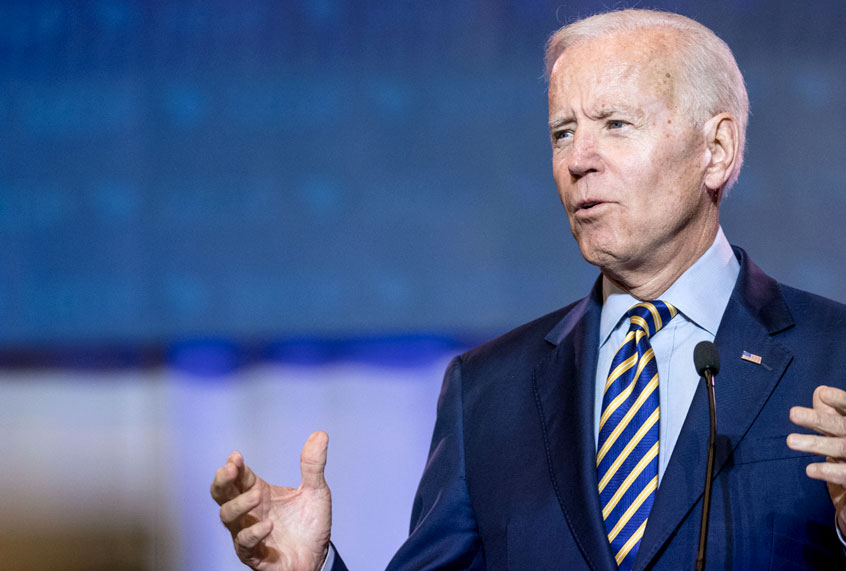Former Vice President Joe Biden falsely claimed he opposed increased funding for state prisons during a defense of the 1994 anti-crime bill that he wrote.
Biden, who has also given misleading statements about his vociferous opposition to mandatory busing, is having a similarly rough time defending the crime bill he shepherded through the Senate. Many Democrats now point to the 1994 legislation as a leading cause of mass incarceration, as well as racial disparities in sentencing.
Speaking at an event in South Carolina on Saturday, Biden claimed that his record on the Violent Crime Control and Law Enforcement Act was “grossly misrepresented” before misrepresenting it himself.
“I didn’t support more money to build state prisons. I was against it. We should be building rehab centers and not prisons,” Biden claimed.
It’s true that Biden did not want to spend as much on prisons as Republican senators did in the ’90s. But he was quite adamant that he wanted to spend billions for new state prisons.
During an August 1994 press conference, Biden said the $10 billion in funding that Republicans called for was “too much money on prisons” before adding, “I like the figure that I wrote in my bills: $6 billion.”
He urged other Democrats to back his proposal to increase spending to build state prisons.
“We built prisons to keep pace with the number of federal prisoners,” he told a congressional conference committee that was working on the legislation in June 1994. “States have fallen behind.”
“They have too few cops, too few prison cells, too few programs to help our children avoid crime,” he said. “We have not built new prisons to keep up with the increase in violent crime in America. We have not tried and failed — we haven’t tried at a state level before. And this is partially our attempt to help the states and localities try.”
Asked by CNN about Biden’s false claim, campaign spokesman Andrew Bates insisted that Biden did not mean he had opposed all additional state prison spending, but rather the extra $4 billion that Republicans wanted. “Vice President Biden was referring to how Republicans wanted to provide more money for prison construction than he felt was right,” Bates told the network.
But in the years that followed the bill’s passage, Biden repeatedly bragged that the extra spending for state prisons was a good thing — even as mass incarceration continued to grow, disproportionately affecting African-American men.
In a 1997 speech, Biden touted “more prisons” as one of the “smart” policies the Senate had implemented.
“It was only a very few years ago when no one thought we could do anything about violent crime. But in 1994, we started getting smart. We did it all: more police, more prisons, more treatment and more prevention. And what was unthinkable just a few years ago has happened. Just look at the most recent FBI data: Murder has fallen to the lowest rate since 1970,” he said.
In a 1998 press release, Biden’s office touted his support for additional state prison funding.
“Delaware leads the nation with some of the toughest and longest sentences,” Biden said in the press release. “The Crime Law is backing up that tough talk on crime with the funding needed to help states keep criminals off the streets.”
Biden’s misleading defense of his support for state prison funding also undercuts his defense for writing a bill that expanded incarceration in America.
Biden said at an event in May that the crime bill “did not generate mass incarceration” because most inmates end up in state prisons instead of federal ones. He failed to mention, just as he did on Saturday, that he supported billions to build new state prisons and backed a provision that required states to incarcerate people for longer periods if they wanted to get the funding.
It is true that the 1994 bill did not directly cause mass incarceration, which had been growing for the preceding two decades. But there is little doubt that the bill exacerbated the trend, and particularly impacted African Americans. Biden was also a key driver of other bills that made this problem worse.
In 1984, he co-sponsored a bill that imposed mandatory minimum sentences. In 2001, the U.S. Sentencing Commission found that “whites are more likely than non-whites to be sentenced below the applicable mandatory minimum.”
In 1986, Biden co-sponsored a bill that imposed harsher penalties on crack cocaine users than on powdered cocaine users. After the bill imposed 100 times stricter penalties for crack cocaine than powdered cocaine, the Sentencing Commission found that “blacks accounted for 88.3% of federal crack cocaine distribution convictions in 1993.”
The African-American incarceration rate increased from 1,200 per 100,000 in 1985 to 2,450 per 100,000 in 2000 — and increased to 3,457 per 100,000 among black men.


